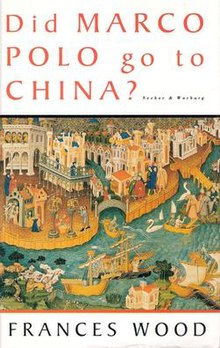Did Marco Polo Go to China?
 First UK hardcover edition, 1995 | |
| Author | Frances Wood |
|---|---|
| Language | English |
| Subject | History |
| Published | 1995 |
| Publication place | United States |
| Media type | |
| ISBN | 978-0-8133-8999-8 |
Did Marco Polo Go to China? is a 1995 book by Frances Wood, arguing that Venetian explorer Marco Polo never visited China as told, but travelled no further than Persia, basing his description of China on accounts from Persian travellers.
The book takes notice of deficient detail in Polo's stories (for example, he does not mention the Great Wall, the use of chopsticks as eating utensils, tea, foot-binding, Chinese calligraphy or other significant features), and of the lack of Chinese records of Polo's presence.
Some archeologists have pointed to inconsistencies and inaccuracies in his description of Kublai Khan's attempted invasions of Japan in 1274 and 1281, saying that Polo's account mixed up details from the two invasions.[1]
Several other scholars have argued in favor of the established view that Polo was in China.[2] The book has been criticized by Igor de Rachewiltz and Morris Rossabi (author of Khubilai Khan: his life and times).[3] Stephen G. Haw argues that Marco's account is much more correct and accurate than has often been supposed and that it is extremely unlikely that he could have obtained all the information in his book at second hand.[4] Reviewing Haw's book, Peter Jackson (author of The Mongols and the West) has said that Haw “must surely now have settled the controversy surrounding the historicity of Polo’s visit to China” [5]
Responses have included that of Igor De Rachewiltz, translator and annotator of The Secret History of the Mongols:
"I regret to say that F.W's [Frances Wood] book falls short of the standard of scholarship that one would expect in a work of this kind. Her book can only be described as deceptive, both in relation to the author and to the public at large. Questions are posted that, in the majority of cases, have already been answered satisfactorily...her attempt is unprofessional; she is poorly equipped in the basic tools of the trade, i.e., adequate linguistic competence and research methodology...and her major arguments cannot withstand close scrutiny. Her conclusion fails to consider all the evidence supporting Marco Polo's credibility." [6]
References
- ^ Explorer Marco Polo 'never actually went to China', The Daily Telegraph, 9 August 2011
- ^ A counter-argument from Dr Igor de Rachewiltz at The Australian National University
- ^ Did Marco Polo really go to China?
- ^ Marco Polo's China, by Stephen G. Haw.
- ^ Jackson, Peter (2007) Review of Stephen G. Haw Marco Polo's China. A Venetian in the Realm of Khubilai Khan, Bulletin of the School of Oriental and African Studies, 70, pp 438-40.
- ^ Igor de Rachewiltz, "Marco Polo Went to China," Zentralasiatische Studien 27 (1997), pp. 34-92.
